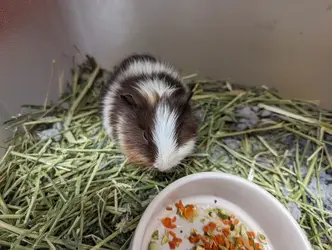WinstonPatrick
Junior Guinea Pig
Hi guys, just seeking some thoughts from anyone who has had a baby guinea with a respiratory infection. I'm the petcare department manager at a large store chain. I am not fond of our guinea breeder, or any of our mass breeders. They sent us 3 baby guineas at 200grams, 186grams, and 156grams. Our littlest one was to me too small. He developed a respiratory infection within 2 days. He has been to our vet as an emergency because we were worried about his breathing. The vet said it's because he can't breath well through the mucus in his nose. He is on Septra antibiotic and they are culturing his discharge to make sure there isn't any other bacteria that would require a different antibiotic. We are also trying to get as much EmerAid Intensive Care liquid fed to him via syringe as possible. He has lost 30 grams of weight since Tuesday.
I'm wondering if there is anyone with experience that might have experience or thoughts as to what else we could do to help him. Our vet says it won't be till tomorrow that we would see improvement hopefully. I'm attaching a photo. I named him Baby Steve.
[HEADING=2][/HEADING]
I'm wondering if there is anyone with experience that might have experience or thoughts as to what else we could do to help him. Our vet says it won't be till tomorrow that we would see improvement hopefully. I'm attaching a photo. I named him Baby Steve.
[HEADING=2][/HEADING]
